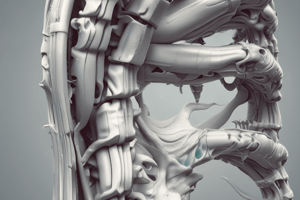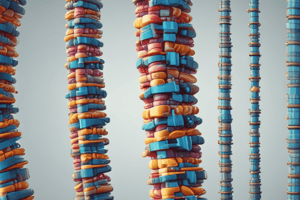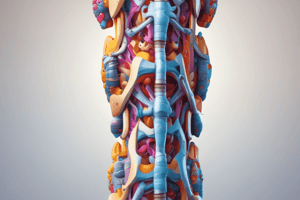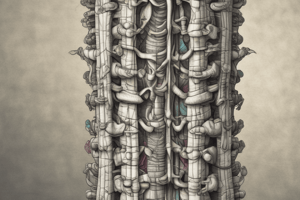Podcast
Questions and Answers
A column with 3 flexible curvatures has a resistance of R=10.
A column with 3 flexible curvatures has a resistance of R=10.
False (B)
Normal curvatures of the spinal column have an index of 95% within the normal limits of 94-96.
Normal curvatures of the spinal column have an index of 95% within the normal limits of 94-96.
True (A)
Exaggerated curvatures (dynamic type) have a Delmas index higher than 94%.
Exaggerated curvatures (dynamic type) have a Delmas index higher than 94%.
False (B)
Attenuated curvatures (static type) have an index greater than 96%.
Attenuated curvatures (static type) have an index greater than 96%.
The intervertebral disk is composed of a central portion called the annulus fibrosus.
The intervertebral disk is composed of a central portion called the annulus fibrosus.
Water and proteoglycans concentrations are highest in the annulus fibrosus of the intervertebral disk.
Water and proteoglycans concentrations are highest in the annulus fibrosus of the intervertebral disk.
Collagen concentrations are highest in the annulus fibrosus of the intervertebral disk.
Collagen concentrations are highest in the annulus fibrosus of the intervertebral disk.
The collagen fibers of the annulus are arranged in parallel sheets called lamellae.
The collagen fibers of the annulus are arranged in parallel sheets called lamellae.
The collagen fibers in the intervertebral disk run nearly vertically to effectively resist sliding forces.
The collagen fibers in the intervertebral disk run nearly vertically to effectively resist sliding forces.
Distraction forces are components of horizontal plane movements.
Distraction forces are components of horizontal plane movements.
The greater the ratio between disk thickness and height of the vertebral body, the lower the mobility of the segment.
The greater the ratio between disk thickness and height of the vertebral body, the lower the mobility of the segment.
The nucleus position in the intervertebral disc should be closer to the periphery for better shock-absorbing capabilities.
The nucleus position in the intervertebral disc should be closer to the periphery for better shock-absorbing capabilities.
Compression force raises hydrostatic pressure in the nucleus pulposus of the intervertebral disk.
Compression force raises hydrostatic pressure in the nucleus pulposus of the intervertebral disk.
Increasing nuclear pressure inhibits radial expansion of the annulus fibrosus in the intervertebral disk.
Increasing nuclear pressure inhibits radial expansion of the annulus fibrosus in the intervertebral disk.
Torsional forces in the intervertebral disk only affect fibers oriented in the direction of twist, leaving fibers in other layers unaffected.
Torsional forces in the intervertebral disk only affect fibers oriented in the direction of twist, leaving fibers in other layers unaffected.
Shear forces in the intervertebral disk are produced during vertical separation.
Shear forces in the intervertebral disk are produced during vertical separation.
The pressure within the nucleus reinforces the peripheral annulus fibrosus.
The pressure within the nucleus reinforces the peripheral annulus fibrosus.
Pressure in the Nucleus Pulposus disc is lower when bending forward while holding a load.
Pressure in the Nucleus Pulposus disc is lower when bending forward while holding a load.
Lifting a load with the knees flexed places more pressure on the lumbar disc than lifting with straight knees.
Lifting a load with the knees flexed places more pressure on the lumbar disc than lifting with straight knees.
Horizontal facet surfaces in apophyseal joints favor lateral flexion.
Horizontal facet surfaces in apophyseal joints favor lateral flexion.
Sitting in an erect position produces greater disc pressure than sitting forward-slouched.
Sitting in an erect position produces greater disc pressure than sitting forward-slouched.
Each apophyseal joint is formed by the articulation between opposing facet surfaces.
Each apophyseal joint is formed by the articulation between opposing facet surfaces.
Most apophyseal joint surfaces are oriented either horizontal or vertical.
Most apophyseal joint surfaces are oriented either horizontal or vertical.
Shapes of the vertebrae do not influence the predominant motion at each spinal region.
Shapes of the vertebrae do not influence the predominant motion at each spinal region.
The attachment of ribs or ligaments has no effect on spinal motion.
The attachment of ribs or ligaments has no effect on spinal motion.
Local muscle actions do not impact the motion at different regions of the vertebral column.
Local muscle actions do not impact the motion at different regions of the vertebral column.
Flashcards are hidden until you start studying




